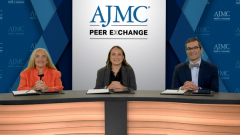
Closing Thoughts from Panelists
Closing thoughts from all panel members.
Episodes in this series

Casey Butrus, PharmD: Thanks to you all for this rich and informative discussion. Before we conclude, I’d like to get some final thoughts from each of you. [Dr Baldwin], I’ll start with you.
Hilary Baldwin, MD: I think that successful quality acne care is a very carefully orchestrated regimen of combination therapies, as we keep saying, attacking acne from as many of the 4 pillars of acne pathophysiology as we possibly can. So I’m looking at lesion morphology and severity, but I’m also looking at patient issues and patient concerns that make them unique because one size absolutely does not fit all. And I know this is naive of me to request, but if I was allowed to have a wish list, on the very top, as I said before, is that no drug should be categorically out of the hands of any acne patient.
Casey Butrus, PharmD: [Dr Feldman], we’ll move on to you.
Steven Feldman, MD, PhD: The new treatments are great, but they’re not going to work better than the old treatments if we don’t get patients to use them. And I think everybody should consider it their responsibility to do what they can in this regard. A dermatologist, Danny Berg [MD, at the Swedish Medical Center, in Seattle, Washington], taught me about the Vietnamese Buddhist philosopher Thich Nhat Hanh who said, “Hey, when the lettuce is not growing well, you don’t blame the lettuce.” So we need to figure out the things we need to do, to get people to use their medicines. And I think one of the key things will be to find some way to create that sense of accountability.
Casey Butrus, PharmD: And [Dr Mostaghimi], finally, you.
Arash Mostaghimi, MD, MPH, FAAD: I think I’ve learned that the key to adherence is to give my patients [Dr Feldman’s] phone number, I think they’re going to do a lot better. I think that’s what I took from that conversation. What I think has been really remarkable about this conversation, and that we focused on the prior authorization, that role in terms of the waste inefficiency that the system can generate. What we haven’t talked about is, really, there is also waste inefficiency in the way that acne is treated, and there is a balance in the middle. But I think [Dr Baldwin’s] last point [that] this idea that one size doesn’t fit all, in general thinking about policy solutions or broad-based population approaches, a really good population-based approach works for 80% of people. And there’s going be probably 5% to 10% that the dermatologists are doing something funny that we can get guidance from the payers [on], and there’s going to be another 5% to 10% where this person [has] just something fundamentally different about them that may not even be quantifiable, but it’s some qualitative aspect of us as physicians sitting with somebody, talking to them, learning about them, that we identify a specific need or different way of treating them that could be beneficial. So I think identifying how can we automate that 80% in the middle perfectly and then also be as efficient and gracious as possible with the other two ends of that, I think that’s going to be the secret moving forward.
Casey Butrus, PharmD: That’s great. I think my final thoughts from the health plan perspective is to try to keep the clinician in mind, try to understand what’s actually going on in clinical practice vs what’s listed in the guidelines since guidelines may not be up-to-date or providers may not really be using the guidelines to drive their clinical practice. So having the conversation, I think, is always the first step for me to really understand a disease state and how it’s being treated currently with best practices. Thank you again. And to our viewing audience, we hope you found this AJMC® Peer Exchange to be useful and informative.
Transcript edited for clarity.
Newsletter
Stay ahead of policy, cost, and value—subscribe to AJMC for expert insights at the intersection of clinical care and health economics.










